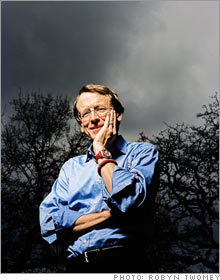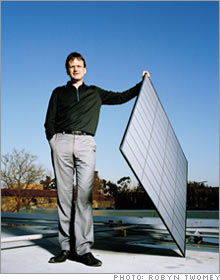|
|
The jolly green bubbleFortune's Adam Lashinsky explores why Silicon Valley's premier VCs have that old-time eco-religion.(Fortune Magazine) -- There's a new bubble in Silicon Valley, and I'm in the office of John Doerr, watching it expand. Doerr, of course, is the legendary venture capitalist and inflator-in-chief of the last glorious investment craze. (Remember "The Internet is the greatest legal creation of wealth in history"? That was him.) So what's his take on green technology? "This could be the biggest economic opportunity of the 21st century." Doerr is merely the most prominent of a bevy of VCs and entrepreneurs to lunge into "clean" technology - solar panels, coal gasification, electric cars, and the like. "In 2002, on a scale of one to ten, the interest in this field was minus two," says Martin Roscheisen, CEO of Nanosolar, a solar-panel startup that has since raised $100 million. "The same guys who are the leading lights of clean tech were staring at me saying, 'No VC will ever invest in this.'"
 Nanosolar, funded by a bunch of firms including Benchmark Capital and the hedge fund SAC Capital, is going head-to-head with Miasole, which is backed by, among others, Kleiner Perkins (Doerr's firm). These two startups may well be the Yahoo and Excite@Home of solar. Investment bankers certainly know an opportunity when they see it. "Our view is it's the next technology space for the next 20 years," says Jeff Lipton of Jefferies & Co., one of several banks hoping for some red-hot green action. What, you may be asking, makes all these computer people experts on the environment? Well, not much. Miasole is headed by an executive from the disk-drive industry. Nanosolar's Roscheisen was previously CEO of eGroups, a dot-com sapling that sold out early to Yahoo. To bone up for his new gig, he traveled the world learning about solar technology. "I have a Ph.D. in electrical engineering," he says. "I read myself into the chemistry." Dan Whaley, a software geek who co-founded the airline reservation site GetThere.com, has started Climos, a company figuring out how to naturally scrub CO2 from the atmosphere. (A disclosure: In the last bubble Whaley and I were among Women.com's ten most eligible bachelors of Silicon Valley. He's still available, ladies.) Even Silicon Valley's attorneys are repotting themselves. Josh Green, a seasoned (and aptly named) securities lawyer, is now an eco-focused VC with Mohr Davidow. "I thought I had as good a shot as anybody," he says. It's almost easier to single out Valley players who aren't into green. Sequoia Capital, which funded Cisco (Charts), Yahoo (Charts), Google (Charts) and YouTube, doesn't have a clean-tech focus. But Mark Stevens, Sequoia's semiconductor expert, recently spent four months studying the field. @Ventures, the VC arm of dot-com flameout CMGI, has devoted its most recent fund to clean-tech investments. It just bought into a company called Earthanol, which is building plants to convert waste into ethanol. For all the excitement, green tech hasn't had its Netscape moment yet. Two ethanol companies, VeraSun (Charts) and Aventine Renewable Energy (Charts), went public last year, but their stocks cratered when the market cooled on ethanol. The biggest hit so far - First Solar (Charts), which went public late last year - wasn't even funded out of Silicon Valley. Its primary backer was the late Wal-Mart scion John Walton. Back in Doerr's office, a stack of the book "An Inconvenient Truth," by his friend Al Gore, lies on the floor. Fred Krupp, president of Environmental Defense, is waiting on hold. I ask Doerr if green is the next bubble. "The Internet wasn't a bubble," he objects. "It was a boom." He explains that green investments will thrive because of
ballooning
energy prices, promising new technology and seismic shifts in
public
opinion and government policy. He's got a point. Could he be
right? Why
not? Bear in mind that those dot-com-era prognostications no
longer seem
so ridiculous. Just because a guy says things like "Let's get some
green
giants here in this jolly valley" doesn't mean he isn't about to
make his
next killing. From the April 16, 2007 issue |
|

